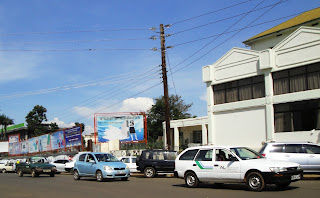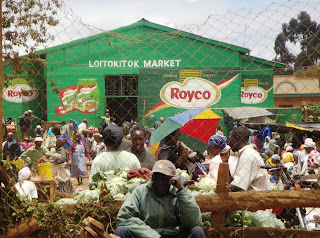Many people in social sites and in the mainstream media concur on the need to not only condemn the recent violence against presidential aspirant, Raphael Tuju in Kisumu but to stop undue linkage of such acts with Raila or any other person without evidence. I do not know who the stone throwers were who disrupted Tuju's campaign raly.
The point however is that Tuju chose to go to Kondele and not any other part of Kisumu or Nyanza with full knowledge about how the crowds there often behave. The same Kondele crowds often tell off Raila in some instances. Many politicians who go courting them have rich experiences with the youths in Kisumu and elsewhere.
 |
| A section of Kisumu City, Kenya |
Many young people and most stakeholders in Kisumu Town and Nyanza appreciate the need to keep violence out of politics and more so in Kisumu and many people within the Youth Movement in Nyanza have done much towards managing the youths positively, a process that continues.
There are moments when some of us have also had to ask some of those who fault Raila to restrain themseves from merely falling into the band wagon of those who want to be seen as standing up against Raila, so to speak. This was the case when some of us felt there was no need to organize the youths to heckle Raila or hold placards on the day the PM was visiting Kisumu with some benefactor who wanted to aid a school in some slum.
Raila is not infallible and neither is he impermeable to ideas and opinions and there are many people who have successfully reached him and influenced or offered opinion to help change his thinking about things, with positive results.
What I disagree with is the undue pre-occupation with Raila in everything even when this is unwarranted. Indeed as David Makali noted recently in an opinion article in The Star, anybody who wants some publicity or popularity or media coverage must pour vitriol on Raila. I notice this pre-occupation often in these forums and I have always said there are many presidential candidates who we should discuss and seek to mercilessly interrogate as we do Raila.
But to elevate Raila to a demi-god against whom all others must be measured and from whom the very highest standards must be sought or the heaviest demands be made, is to be deceitful. I have even written about the futility of any politician, especially from Nyanza campaigning on the platform of "finishing" or "taming" the Odinga dynasty as missing the point because the problems of Nyanza cannot be laid at the step of Odingaism per se, if we were to be honest.
I have said elsewhere that Tuju or any other person from Nyanza need not be politicians, MPs or be presidents to help change Nyanza for the better. Let's learn to make a contribution to the betterment of Nyanza from the humble positions and modest resources that we have because there is space for all of us.
I have not seen anybody trying to make a honest effort to change Nyanza running into any problems. But grandiose ideas about pulling Raila down or finishing the Odinga dynasty -like it or not, are often treated with the kind of reaction that met Tuju and you have a practical experience in that area.
Let us take the case of Cyprian Awiti formerly of Marie Stopes Clinic. He has done some commendable development work, helping through harambees etc without necessarily attempting to antagonize the Luo community or making it his trade mark to make Raila his punching bag. He has no problems.
The reality is that Kenya is composed of ethnic nationalities that largely still guard their own or show greater loyalty to their own leaders - all the communities. The Luos have acquired undue prominence due to their population and history in national politics from the 1950s through to the present time. The Kalenjin are gravitating around Ruto now yet we don't see this bravado being displayed against him or the lampooning of the Kalenjin community as "following him like sheep", Uhuru the same etc.
On the media, it is true there are biases due to a variety of factors including ownership, ethnicity, and uninformed opinions and stereotypes and generalizations over the years. Why is it that the Luo are portrayed in the media as the most prone to HIV/AIDS as if other communities do not die of the scourge? Why is the media hyping the whole question of the "ter -calling it wife inheritance-instead of the proper term of widow guardianship, or carry campaigning for the circumcision among the Luo and not so much among the Turkana, Teso or others? Who owns the media that stereotype the Luo as lazy, violent or blind or bewitched followers of Raila?
The politics of media ownership is as a thing many of you from Nyanza who have been leaders, continue to be or aspire to be,have never taken seriously and the manipulation of public opinion by those who own the instruments of mass communication will continue to make the community begin to recoil into self blame as is now emerging, sadly even among the elite.
How come enterprising monied people from Nyanza have never thought about serious investment in the media or joint partnership yet they are the largest consumers? Cut off the Nyanza and Western Province Media consumers and the media in this country will virtually be dead! Is this area of investment also being blocked by Raila's dominance of Nyanza politics? His name sells, why has no Nyanza Enterprise used it effectively to create jobs or create a sustainable media venture?
The media the world over is not non partisan or objective. That is not possible. Indeed there is nothing wrong with the media taking positions, but in many countries, US, UK, etc, it is based on ideology or interests other than ethnicity. What is demanded of the media is fair play so that even as they take a certain stand, they should also give space to the other side to either make their point ore reply to any claims made against them and even then, they are not obliged to give equal coverage or opportunity to all the contesting sides. The media may have a social role but it is basically business with big players including politicians. How come Royal media stole the very soul of the Luo community by naming one of its media outlets, _
Ramogi (the Luo Patriarch),
kar chuny Jaluo- and often uses the outlet to stereotype the community, without anybody protesting against such insult.
Look at the opinion polls, which are basically commissioned by interests both within the media and political class. They never do the polls on their own volition, it is at the behest of a client, most of them anonymous and they will, using the partisan media, begin to play up certain positions to build scenarios that will breed violence by raising false hopes here or dashing them at the same time.
Kenya Correspondents Association members, the journalists spread across the country- are operating within certain circumstances, both influenced by their employers and also their communities. There are many cases of violence or political intolerance in many parts of this country but those regions have effective gatekeepers within the media who ensure issues from those regions are not overly blown out of proposition, Kisumu and Nyanza have no such effective gatekeepers and the region must continue making news, mostly negatively.
I will give you one case. A minor incident between some few boda boda operators in Kisumu slightly more than a year ago occurred at Kondele in which they burnt a tyre. Because it was Kisumu, the incident was played on national television for a whole day during prime time news with the slant that Kisumu had predictably erupted into violence again!
That afternoon, more than 200 people, among them tourists who were due to fly to Kisumu cancelled their flights and hotel bookings -afraid of the violence. What was the cost to the economy of Kisumu and Nyanza? How many cases of violence occur in Nairobi or other towns including police shootings of alleged criminals etc and these never feature as much as any incident in Kisumu?
The authorities in Nairobi were frantically calling the police and the provincial administration in Kisumu over this eruption of violence to which the Kisumu authorities genuinely expressed surprise as the magnitude of the so called violence was so negligible that the police at Kondele patrol, base had dealt with it when it occurred and sorted out the disagreement between the bod aboda operators early mid morning!
Kisumu residents were equally perplexed that TV stations were running "violence" footage of tyre burning in Kondele when the streets were clear and people were going about their business normally.
If as people from Nyanza, using whatever media, build a negative belief and opinions about the people, leaders and the region, it will stick. Remember the old Luo adage about
"Ng'ama ketho gire konye ketho!
I am sure I have taken a disappointingly radical but realistic view of things and I dare invite all of us to discuss openly the question of ethnicity and the challenge of national cohesion/nation building. I know of many Luos who are trying to run away from their "Luoness", to appear more nationalistic, partly out of selfishness and deceit or naively thinking that other communities will appreciate them mre and tell them that "look, you are more liberated that the rest of the more undemocratic Luo who follow Raila like sheep".
 |
| Oginga Odinga Street, Kisumu. |
We have heard such comments before and for some of us, it does not make us recoil into self blame or make us attempt to appear good as defined by other people. There are people who even say Luos are only fit in the opposition and expect Raila to ditch the Grand Coalition for the Opposition benches.
 |
|
| Youth in Migori during a police recruitment process. |
|
|
|
|
Dare suggest that Raila and his Luos have played the role of opposition long enough and now is the turn for any other community to fit into that shoes and vigorously perform the watchdog role. You will see them coming up with excuses or some other spurious arguments.



























